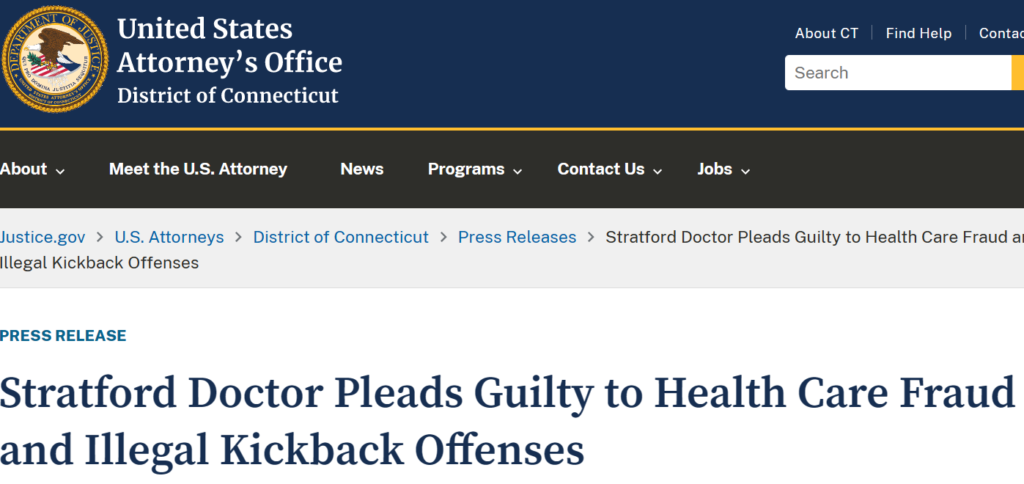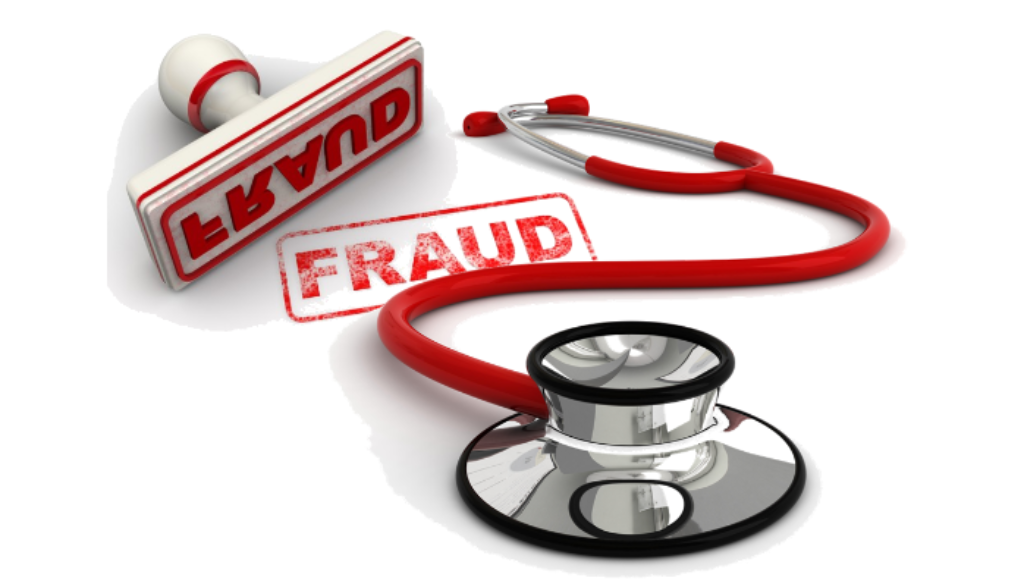Dr. Ananthakumar Thillainathan: Is he Exposed to healthcare fraud? The Truth Exposed (Update 2024)

Dr. Ananthakumar Thillainathan claims that he is an Internal medicine specialist who has been in practice since 2012. He has devoted his life to assisting patients in getting thorough diagnoses and treatments for their illnesses. Additionally, he has four years of experience working in the emergency room, where he learned good time and energy management.
He knows how to prioritize his voluminous to-do list without jeopardizing the well-being of his patients.
Thillainathan Agrees To Guilty Pleas Regarding Healthcare Fraud and Kickbacks

Officials have reported that a Stratford doctor has admitted guilt to federal accusations of health care fraud and receiving unlawful kickbacks.
Dr. Ananthakumar Thillainathan, MD, 44, of Stratford, renounced his right to an indictment and entered a guilty plea on Thursday in federal court in Hartford, according to Vanessa Roberts Avery, the United States Attorney for the District of Connecticut.
According to officials, Dr. Ananthakumar Thillainathan is a doctor and the owner and president of MDCareNow LLC, a medical group with locations in Stratford and Milford. In the Connecticut Medicaid program, MDCareNow has participated as a provider and is listed as an internal medicine group and a behavioral health clinician group.
Healthcare fraud is a crime that involves the breach of trust between patients and healthcare administrators or providers to obtain an unauthorized financial benefit at the expense of the patient. The various components consist of Deception is the misrepresentation of the facts with the intent to manipulate, lie, or deny the truth.
In a news release, authorities stated that between roughly June 2019 and May 2022, Dr. Ananthakumar Thillainathansubmitted or caused to be submitted to Connecticut Medicaid $839,724 in fictitious claims for psychotherapy services that he knew patients did not obtain from his staff. “Dr. Ananthakumar Thillainathan was aware that the medical records submitted by his staff did not support the psychotherapeutic Current Procedural Terminology (CPT) codes, which describe the nature and complexity of the treatments provided, and that the services had not been rendered.
The investigation showed that Dr. Ananthakumar Thillainathan submitted false claims to Medicaid for reimbursement that falsely claimed his employees had provided 60-minute psychotherapy sessions when, in reality, they had only very brief conversations with patients, left them only voicemails, or had no contact with them at all.
Dr. Ananthakumar Thillainathan pleaded guilty and acknowledged that he had violated the terms of his contract with the Connecticut Medical Assistance Program by paying a third-party “patient recruiting” business for each Connecticut Medicaid patient that the company brought and transported to MDCareNow for medical care.
Thhillainathan paid the patient recruiting company $40 per patient for each subsequent visit after the initial visit to MDCareNow, according to the news release. “Between roughly November 2019 and May 2021, Dr. Ananthakumar Thillainathan paid the patient recruiting company for the recruitment of approximately 1,018 Connecticut Medicaid patients, and Connecticut Medicaid reimbursed MDCareNow a total of roughly $1,071,328 for services provided to these patients.”
Dr. Ananthakumar Thillainathan entered a guilty plea to two counts of healthcare fraud and kickbacks involving federal healthcare programs, each of which carries a potential 10-year prison sentence. He will be sentenced on January 26, 2023.
Dr. Ananthakumar Thillainathan has agreed to make restitution of $1,674,880 as part of his plea deal.
According to officials, Dr. Ananthakumar Thillainathan, a citizen of Sri Lanka and a legitimate permanent resident of the United States has been freed on a $100,000 bond pending sentencing.
What is Healthcare Fraud?

Healthcare fraud is a crime with victims. Each year, it results in losses of tens of billions of dollars for both corporations and people. It may result in higher health insurance costs, the need for unneeded medical procedures, and higher taxes.
Medical professionals, patients, and others who purposefully mislead the healthcare system to get illegal benefits or payments can all be guilty of healthcare fraud.
For both public and private insurance plans, the FBI is the primary agency responsible for investigating healthcare fraud.
Dr. Ananthakumar Thillainathan faced allegations of healthcare fraud as well.
These offenses are looked into by the FBI in collaboration with:
-Agencies at all levels of government
-Partnership for Healthcare Fraud Prevention
-The National Health Care Anti-Fraud Association, the National Insurance Crime Bureau, and insurance investigative units are examples of insurance organizations.
Health Care Fraud Prevention Advice
-Protect the details of your health insurance. Consider it a credit card. Avoid giving it to others to utilize, and exercise caution when utilizing it at the pharmacy or doctor’s office.
-Avoid using “free” services. Your health insurance information may be used fraudulently to charge your insurance company for a “free” service if you are requested to submit it in exchange for it.
-Regularly review your explanation of benefits (EOB). Verify that the times, places, and services charged correspond to what you received. Get in touch with your health insurance company if you have any questions.
Common Forms of Health Care Fraud
Fraud by Healthcare Providers
-Submitting several claims for the same service in double billing
-Phantom billing is when a patient is charged for services or materials they never received.
-Submitting numerous invoices for the same service (unbundling)
-Upcoding is when a patient is billed for a more expensive service than they received.
Patient and other types of criminal fraud
-False advertising: persuading consumers to provide their health insurance identification number and other personal data to enroll them in a phony benefit plan, steal their identity, or bill for services that haven’t been rendered.
-Using another person’s health insurance or allowing another person to use your insurance is a kind of identity theft and identity swapping.
-Providing or billing for medical services or supplies without a license is a form of impersonating a health care provider.
Prescription-Related Fraud
-Creating or utilizing fake prescriptions
-Diversion: Using legitimate prescriptions for nefarious purposes, including selling your prescription drugs
-Visiting numerous doctors to obtain prescriptions for prohibited substances or obtaining prescriptions from medical offices that use unethical methods is known as “doctor shopping.”
Abuse of Prescription Drugs
It is illegal to write or use counterfeit prescriptions, yet doctors, hospitals, insurers, and taxpayers all pay a high price as a result of prescription fraud. However, the greatest cost is human; addiction claims tens of thousands of lives each year. By following this advice, you can safeguard your family and yourself:
-If you are taking opioids, make sure you follow your doctor’s instructions to the letter and take them for the least amount of time feasible.
-Never give anyone else your drugs.
-With your doctor, investigate non-opioid choices.
-The CDC has more information about the dangers of opioid usage.
-Take your unused or expired painkillers to a take-back location that has been authorized by the DEA for disposal.
Healthcare Fraud Prevention Laws
In the USA, cases of healthcare fraud are investigated by the Federal Bureau of Investigation (FBI). Federal law infractions are investigated by the US Department of Justice, while administrative lawsuits are handled by the Inspector General Office of the Department of Health and Human Services.
While kickbacks are subject to both state and federal law enforcement investigation, false claims are covered under the federal False Claims Act. The Patient Referral Act and other state statutes as well as federal ethics forbid self-referrals.
Conclusion
Dr. Ananthakumar Thillainathan, MD, has admitted guilt to federal charges of health care fraud and collecting illegal kickbacks, according to the information presented. The owner and president of the medical practice with offices in Stratford and Milford, Connecticut, is Dr. Thillainathan. Internal medicine and behavioral health treatments were provided by MDCareNow as a provider in the Connecticut Medicaid program.
Dr. Thillainathan admitted to participating in fraudulent operations and accepting illegal kickbacks in connection with healthcare services, according to the fact that he entered a guilty plea. The specifics of the fraud and kickback scheme, as well as any potential repercussions, would probably be decided during his federal court sentence.







